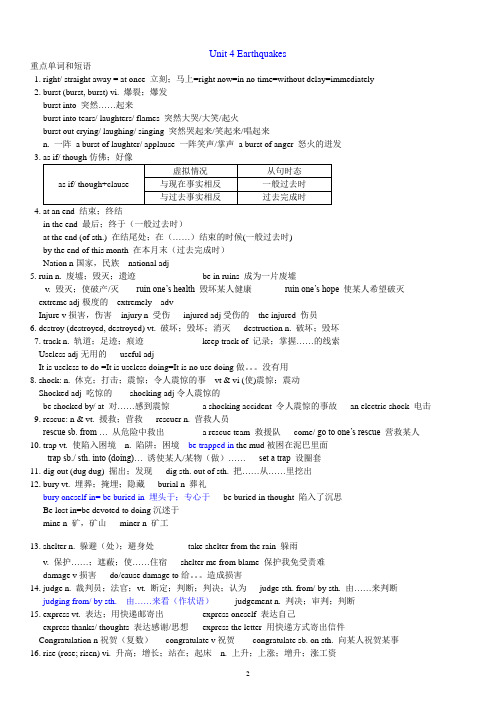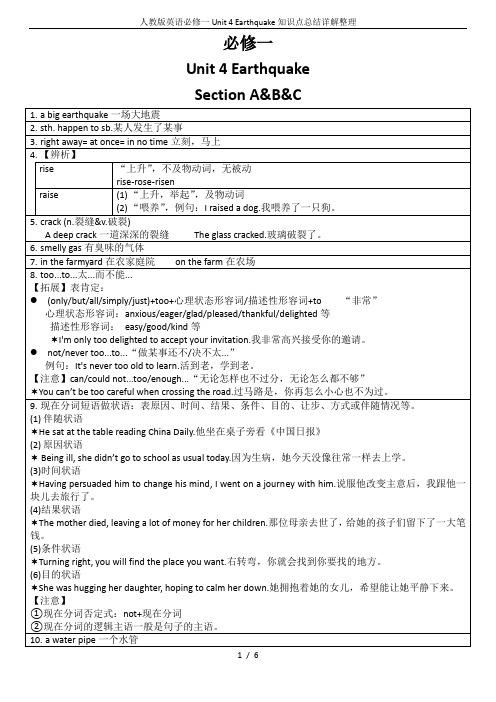人教版高中英语必修一unit4Earthquakes语言点
人教版高一英语必修一Unit 4 Earthquakes知识点

Unit 4 Earthquakes重点单词和短语1. right/ straight away = at once 立刻;马上=right now=in no time=without delay=immediately2. burst (burst, burst) vi. 爆裂;爆发burst into 突然……起来burst into tears/ laughters/ flames 突然大哭/大笑/起火burst out crying/ laughing/ singing 突然哭起来/笑起来/唱起来n. 一阵a burst of laughter/ applause 一阵笑声/掌声a burst of anger 怒火的迸发as if/ though+clause虚拟情况从句时态与现在事实相反一般过去时与过去事实相反过去完成时4. at an end 结束;终结in the end 最后;终于(一般过去时)at the end (of sth.) 在结尾处;在(……)结束的时候(一般过去时)by the end of this month 在本月末(过去完成时)Nation n国家,民族national adj5. ruin n. 废墟;毁灭;遗迹be in ruins 成为一片废墟v. 毁灭;使破产/灭ruin one’s health 毁坏某人健康ruin one’s hope 使某人希望破灭extreme adj极度的extremely advInjure v损害,伤害injury n 受伤injured adj受伤的the injured 伤员6. destroy (destroyed, destroyed) vt. 破坏;毁坏;消灭destruction n. 破坏;毁坏7. track n. 轨道;足迹;痕迹keep track of 记录;掌握……的线索Useless adj无用的useful adjIt is useless to do =It is useless doing=It is no use doing做。
高中英语必修一Unit4-Earthquakes-教案之语言点详解

新人教版高一英语必修一第四单元Earthquakes教案之语言点详解词汇详解:一.词语辨析1. congratulate / celebrate【解释】congratulate 对他人祝贺为目的,侧重以言语表示祝贺。
celebrate 通常指举行盛大隆重的仪式庆祝或纪念有意义的日子或某件事情。
侧重指以行动来庆祝生日、节日等。
【练习】用上面所提供的辨析词的适当形式填空1). I _________ you on your success.2). We held a party to __________ our success..答案: 1). congratulate 2). celebrate2. destroy / ruin / damage / harm【解释】destroy 表示在肉体上、精神上或道义上的彻底摧毁,使之无法恢复,也可以表示对某物体进行完全的毁坏。
ruin一般指对物体或生命彻底的破坏,但往往是非暴力的,也往往不是一次性打击的结果,常指对美好的或希望中的事物的破坏。
damage 一般指对物体或生命的局部损伤,使整体的价值或作用降低或变得无价值、无作用。
这种损伤可以是暴力的或一次性破坏的结果,也可以指非暴力的长期损害的结果。
harm 一般指伤害有生命的东西,常指伤及人的健康、权利、事业等。
【练习】用上面所提供的辨析词的适当形式填空1). You may get _________ in that shop.二.词性变化Ⅲ重点词汇1. burst v.&n. 爆裂, 爆发, 突然破裂[典例]1).The red balloon suddenly burst.那个红色的气球突然爆了。
2). The police burst through the door.警察破门而入。
3). On hearing the news, Leslie burst into laughter while Tracy burst out crying.一听到这则消息,Leslie突然大笑,而Tracy则突然大哭起来。
人教版英语必修一Unit 4 Earthquake知识点总结详解整理

必修一Unit 4 Earthquake Section A&B&C11.burst➢v.(使)爆裂;(使)膨胀;爆发;burst-burst-burstThe water pipe cracked and burst.➢n.突发,爆发✶There was a burst of laughter in the next room.隔壁房间里突然爆发出一阵笑声。
➢v.猛冲;突然出现✶He burst into the room without knocking.他没敲门就闯进了房间。
【拓展】●burst into+名词=burst out doing 突然...起来✶burst into tears=burst out crying 突然哭起来/ burst into laughter=burst out laughing突然笑起来●burst in闯进●be bursting with充满;爆满✶The roads are bursting with cars.车辆把那些道路挤满了。
● a burst of (突然)一阵lion百万【用法】one million一百万several million几百万a dozen million一千两百万millions of+名词几百万...【其他数字用法】tens of thousands of...数以万计的...hundreds of thousands of...几十万【其他表示数字的词】dozen一打(十二) score(二十)13.event n.(1)事件;(尤指)大事●current/the latest events当前事件/最新事件(2)(体育比赛等的)项目,赛事●one of the major sporting events of the year年度重大体育赛事之一【辨析】event 重要事件;比赛项目The Asian Games were one of the major sporting eventsof the year.亚运会是年度重大体育赛事之一。
人教版(新课程标准)必修1Unit4Earthquakes语言点名师课件

Exercise 2
Complete the sentences.
1. _B_e_f_o_r_e_I_c_o_u_l_d_a_n_s_w_e_r_h_e_r___ (我还没来得及回答), Brenda hung up. 2. _T_h_e__w_h_o_l_e_c_i_ty__la_y__in__ru_i_n_s__ (整个城市成了一片废 墟) after the earthquake. 3. I was wondering why my boss __th_o_u_g_h_t__li_tt_le__o_f_m_y__s_u_g_g_e_st_io_n___ (不重视我的建议).
The soldiers were ___w_o_u_n_d_e_d_-in the battle.
5. P归e纳o拓p展le were shocked.
shock vt.&vi.(使)震惊;震动 n.休克;打击;震惊 shocked adj.感到震惊的
★s归hoc纳ki拓ng 展adj全.令析人震考惊点的 be shocked at/by be shocked to do sth. be shocked that ... come as a shock (to sb.) in a state of shock
The PLA man rescued the old lady from the falling house. 救援队;营救任务
a rescue team; a rescue mission.
(2) trap (trapped,trapped) n.陷阱,骗局 vt. 使受限制(困)于;诱骗 T★h归e 纳be拓ar展w全a析s 考tra点pped in the trap set by the hunter.
人教版高中英语必修1U4 Earthquakes知识要点

Book One Unit 4 Earthquakes1. right away毫不迟疑,立刻right now/at once/ in no timeHe is ill; you should call in the doctor right away.2. It seemed as if the world was at an end. 世界似乎到了末日。
从句表示“(在某人)看来好像;似乎”①It seems/looks/appears as if/though…看起来好像…②Sb./Sth. looks as if/though…(不用seem/appear)③There seems/appears(to be)…(不用look)There appears/seems to have been a mistake.=It appears/seems that there has been a mistake.3. All hope was not lost.不是所有的希望都破灭了。
该句为部分否定。
all, both, everyone, everybody, everything 以及every+名词都表示全部肯定;但当not 在它们之前或之后都表示部分否定。
no one, none nobody, nothing, not…any, 以及no+名词都表示全部否定。
如:①Both of them haven’t read this story.并非他们二人都看过这个故事。
②All of the boys are clever, but none of them can work out this problem.③All bamboo doesn’t grow tall.=Not all bamboo grows tall.4. at an end =finished结束,终止(常作表语)(1) Be patient, his speech will be at an end soon.(2) The war was finally at an end.at the end of 在……尽头(末) by the end of 到……末为止(与过去完成时连用) in the end 最后,终于come to an end结束(用作谓语)bring…to an end使……终止put an end to 使……终止用at the end of, by the end of 和in the end填空(1)How many English words have you learned ______________last term?(2)He became an outstanding doctor __________.(3)My uncle will fly to China ___________ this year.5. burnst into tears=burst out crying 大哭burst into laughter=burst out laughing 大笑6.as if\as though 仿佛;好像He looks as if he has known the secret.The man speaks English as if he were an American.7. congratulate sb. on sth 祝贺某人某事congratulations on sth.8. be proud of 以……为自豪。
【人教版】高中英语必修一Unit-4单元知识点

必修一Unit4 Earthquakes1、In the city, the water pipes in some buildings crashed and burst. 城市里,一些大楼里的水管爆裂。
burst爆裂,突发The square is bursting with tourists。
广场上到处都是游客。
I felt as if my heart would burst with joy。
我觉得自己高兴得心花怒放。
The police burst through the door。
警察破门而入。
There was a burst of laughter in the next room. 隔壁房间里突然爆发出一阵笑声。
联想扩展:(1) burst in on…突然打断He burst in on our conversation. 他突然打断了我们的谈话。
(2)burst into +n。
突然…The speaker burst into angry speech. 演讲者突然讲粗话.(3) burst out + doing突然…The woman burst out crying like a child. 那个妇女突然像小孩一样哭了。
(4)burst to do sth. 迫切想做某事I am bursting to tell you the news. 我迫不及待的想告诉你这个消息。
2、But the one million people of the city,who thought little of these events, were asleep as usual that night。
但是认为这没什么的一百万城里人,那天晚上还像往常一样睡觉。
affair,event,accident,incident,matter, businessaffair 指要做的事或已经发生的事。
人教版必修1Unit4 Earthquakes知识点 1

Unit4 Earthquakes知识点1课题: Unit4 Earthquakes学习目标: 学习第四单元的语言点教学重点:重点语言点的学习Teaching Steps :(教学步骤)Step 1 Reading(读)检查课文的朗读Step2 学习课文语言点本节课主要学习Unit 4 的语言点,内容比较多,但都是高考常出现的内容,希望同学们多用点功、多用点心记住。
看谁能够是出类拔萃的学生,是大家学习的榜样。
1.happen to do..=It happens that .碰巧做某事I happened to be out when he called.=It happened that Iwas out when he called.sth.happened to sb 某事发生在某人身上What happened to you?发生了什么事?2.have a class discussion进行班级讨论3.right away立刻=at once=immediately4.in the countryside of Hubei在湖北农村5.A smelly gas came out of the cracks ......从裂缝里冒出Mice ran out of the fields .............. 从田地里跑出Fish jumped out of their bowls and ponds. 鱼从鱼池和池塘里跳出out ofHe looked out of the window and saw Ann.往窗外望He lives two miles out of the city.在…….. 之外The basket is made out of bamboo.由……. 作成Out of anxiety, he did that.由于… 原因6. think little of .....小看,轻视He always think little of what others say.他从来不把别人的话当回事。
人教版高中英语必修一第8讲:Unit4Earthquakes-语法篇(教师版)

⼈教版⾼中英语必修⼀第8讲:Unit4Earthquakes-语法篇(教师版)Unit4 Earthquakes-语法篇____________________________________________________________________________________________________________________________________________________________________通过本节课的学习掌握关系代词引导的定语从句。
定语从句(Ⅰ)——关系代词的⽤法复合句中修饰主句中某⼀名词或代词的从句,叫做定语从句。
它所修饰的名词或代词叫做先⾏词。
它的基本构成:先⾏词+关系词+定语从句。
连接先⾏词和定语从句的词叫关系词。
关系词分为关系代词和关系副词两种。
关系词的主要作⽤是连接主句和从句,同时指代先⾏词,并在从句中充当⼀定的句⼦成分。
定语从句⼜分限制性定语从句和⾮限制性定语从句。
引导定语从句的词有两种:关系代词和关系副词。
关系代词有that, which, who, whom, whose等;关系副词有when, where, why 等。
其具体⽤法见下表:1.who指⼈,在定语从句中可以充当主语、宾语或表语。
Here comes the girl who wants to see you.想见你的那个⼥孩过来了。
Danny is a man who we should learn from.丹尼是我们应该学习的⼀个⼈。
2.whom指⼈,在定语从句中作宾语,可省略,也可⽤who代替。
Rose is the person whom you should look after.罗斯是你应该照顾的⼈。
3.whose可修饰⼈,也可修饰物,表“所属”关系,whose在定语从句中作定语。
I know the person whose company produces computers.我认识那个⼈,他的公司⽣产电脑。
- 1、下载文档前请自行甄别文档内容的完整性,平台不提供额外的编辑、内容补充、找答案等附加服务。
- 2、"仅部分预览"的文档,不可在线预览部分如存在完整性等问题,可反馈申请退款(可完整预览的文档不适用该条件!)。
- 3、如文档侵犯您的权益,请联系客服反馈,我们会尽快为您处理(人工客服工作时间:9:00-18:30)。
Unit4 Earthquakes编稿:陈玉莲审稿:目标认知重点词汇burst, ruin, injure, shock, rescue, trap, bury, congratulation,judge重点短语right away, at an end, a (great) number of, dig out,重点句型1. too...to的用法2. All...not.... 不是所有的……都……3. ...as if... ……如同……知识讲解1. right away【原句回放】Imagine your home begins to shake and you must leave it right away. 假设你的房子开始晃动,你必须立刻离开。
【点拨】right away意为“立刻,马上”,同义短语为at once。
Are you leaving right away? 你马上就走吗?Call the police right away. 立刻报警!【拓展】表示“立刻”的短语:right away, without delay, immediately, at once, in no time, right now(right now强调此刻,相当于at this moment)Please see into this matter without delay. 请立即调查这件事情。
Right now I am in London. 此刻我在伦敦。
2. burst【原句回放】In the city, the water pipes in some buildings cracked and burst. 在市内,有些建筑物的水管爆裂了。
【点拨】burst (burst, burst)vi. 破裂;胀破;爆裂The balloon suddenly burst. 气球突然爆炸了。
I felt as if my heart would burst with joy. 我觉得自己高兴得心花怒放。
n.爆发;突然爆裂I tend to work in bursts. 我的工作劲头往往是一阵一阵的。
a burst of anger 勃然大怒【拓展】常用短语:burst into + n. = burst out doing sth. 突然……起来burst into tears/song/laughter= burst out crying/singing/laughing突然大哭/唱歌/大笑burst into a room=break into a room 破门而入He burst into the room without knocking. 他不敲门就进了房间。
burst (sth.) open (使)突然打开burst in 突然打断,插嘴burst with 充满The roads are bursting with cars. 路上塞满了汽车。
be bursting to do sth. 急于(或迫切想)做某事at a (one) burst 一口气,一下子3. at an end【原句回放】It seemed as if the world was at an end. 仿佛到了世界末日!【点拨】at an end 结束,终结The hot days are at last at an end. 炎热的天气终于结束了!【拓展】常用短语:at the end of 在……尽头;末端(指时间或空间的一个终点)by the end of 到……结束时;到……时候为止(常与完成时态连用)By the end of last month, he had been on that ship for two years.到上个月为止,他在那艘船上已经两年了。
bring sth. to an end (使)结束;终止come to an end 结束make (both) ends meet 使收支相抵;量入为出,靠微薄收入为生put an end to 使结束The year is at an end/coming to an end. 一年结束了。
in the end 最后, 结果She tried many times to pass the exam, and in the end she succeeded.他试了很多次去通过考试,最终他成功了。
4. ruin【原句回放】In fifteen terrible seconds a large city lay in ruins. 在可怕的十五秒钟内,一座大城市变成了废墟。
【点拨】ruin n. 毁灭;废墟。
表示“废墟、遗迹”时常用ruins:the ruins of ancient Rome 古罗马遗迹;in ruins 荒芜的;be/lie in ruins 严重受损;破败不堪;fall into/go to ruin 衰落;败落The castle now lies in ruins. 这座古堡已成废墟。
bring sth. / sb. to ruin 使某物毁灭;使某人破产The war brought ruin to the country. 战争毁了这个国家。
v. 毁坏;毁掉;使破产I was ruined by the law case. 我被那场官司搞得倾家荡产。
ruin oneself 毁掉自己ruin one’s hopes 使某人希望破灭【拓展】destroy, ruin, damage的区别damage指部分“损坏”、“破坏”或指使用价值有所降低。
它可以用作动词,也可以用作名词,用作名词时常与to something 连用。
Hundreds of houses in the area were damaged by the storm.暴风雨毁坏了这个地区数以百计的房屋。
The accident did a lot of damage to his car. 这次车祸使他的车受到很大的损坏。
destroy只能用作动词,指彻底破坏,以致不可能修复,常作“破坏”、“毁灭”解,也可以指希望、计划等打破。
The earthquake destroyed almost the whole town. 地震几乎毁灭了整个城镇。
His hope of being a writer was destroyed. 他想成为一个作家的希望破灭了。
ruin则表示破坏严重,以致不能修复,但这种破坏不像destroy那样毁灭某物,而是强调致使该物的使用价值发生了问题。
用作动词时,它作“使毁灭”、“使崩溃”解;用作名词时,它表示“毁灭”、“瓦解”、“废墟”等抽象概念。
The house has fallen into ruin. 房子倒塌了。
The company is facing ruin. 这家公司面临破产。
5. dig out【原句回放】The army organized teams to dig out those who were trapped and to bury the dead.军队组成小分队,将受困的人们挖出来,将死者掩埋。
【点拨】dig out 挖出,翻找出The injured men have been dug out of the snow. 受伤人员从雪中被挖了出来。
The truth was dug out. 真相被揭露出来了。
Why did you dig out all these old magazines? 你把这些旧杂志翻出来做什么?【拓展】相关短语:dig down 挖倒dig in 挖土以渗进(肥料等);开始做细致工作dig for 发掘,搜集(资料等)dig into 钻研,掘进去dig at 讽刺,挖苦6. a (great) number of【原句回放】Such a great number of people died because the quake happened while they were sleeping. 这么大数量的人们死去是因为地震发生时人们正在睡觉。
【点拨】a great number of 许多、大量的,后面一定要加可数名词复数。
A great number of problems have arisen. 出现了许多问题。
The concert attracted a great number of people. 音乐会吸引了许多人。
【拓展】表示“许多”的短语归纳:后接可数名词复数:a large/ great/ good number of; a great/ good many; a good few/ quite a few后接可数名词单数:many a +可数名词单数+ 单数谓语动词后接不可数名词:a great/ good deal of; a great/ large amount of; quite a little后接可数名词/不可数名词均可:a lot of/ lots of; a great/ large quantity of; large quantities of; plenty of7. injure【原句回放】Two-thirds of them died or were injured during the earthquake. 三分之二的人在地震中死亡或受伤。
【点拨】injure vt.伤害;使……受伤;injure也可以表示“损害(名誉),伤害(感情)”。
His back was injured. 他的后背受伤。
There were two people injured in the car accident. 在这次车祸中有两人受伤。
He spoke in an injured voice. 他用委屈的声音说话。
injury n. 伤害,损害injured adj. 受伤的the injured 伤者do an injury to sb.伤害某人an injured look/expression委屈的样子/表情【拓展】辨析injure,wound,hurtinjure 指由于意外或事故受伤,为一时难愈之伤。
He can’t play today because he’s injured his knee. 因为伤了膝盖,他今天不能比赛。
wound 指外伤,特别是枪伤、刀伤、剑伤。
The bullet wounded his arm. 子弹伤了他的胳膊。hurt 是“受伤”的一般用语,既可指肉体上的伤害,亦可指精神上的伤害,还可做不及物动词,意为“疼痛;引起痛苦”。
